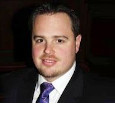Lon O'Sullivan
- Programme: Masters in Finance Part-time
- Nationality: American
- Job Pre-programme: Risk analysis and reporting, Risk department, Morgan Stanley, London
- Job Post-programme: Global Head of Corporate Credit Market Risk, Morgan Stanley
Professional background
Lon started his career at Deutsche Bank in a graduate rotational programme, including eight months in risk management, which he particularly enjoyed. Having secured permanent employment with the firm, he spent two years in equity derivatives before joining a new team in the risk department at Morgan Stanley in New York. Early in 2006, he transferred to their risk department in London and started a risk analysis and reporting team there. He completed the Masters in Finance in 2009.
Quantitative skills
“My career was going very well, but I felt I lacked some of the quantitative skills necessary to be a senior leader in the risk area. I looked around for suitable courses that would help me bridge this gap, and really liked the London Business School programme, including its part-time nature. The Masters in Finance was very appealing as it allowed me to focus on the more specialised and technical aspects of finance, rather than the managerial and behavioural aspects, which I already felt comfortable with. I preferred the part-time to the full-time programme as I wanted to immediately apply my new skills in the workplace and I felt I would add more to the classroom discussions if I stayed current in the market.”
“When I was researching schools, I felt it was important to have a diverse set of classmates, because being successful in business is partly about being able to relate to other cultures, and see things from other perspectives. The sheer diversity of London Business School was a very strong factor for me. There were about 75 of us on the programme, from at least 20 different countries, and including only about three from the UK and seven from the US!”
“I began just as the financial crisis hit, so working in the financial industry and going to a business school at the same time was very interesting! Morgan Stanley showed me tremendous support in this, sponsoring my studies and also being flexible with my time even during the crisis.”
“One of the lessons I learned from the financial crisis was that aggregating and analysing risk at the portfolio level was extremely important, so when I made the move back to New York in 2009, I set up a new portfolio analysis team, sitting in the market risk function. So I transitioned from a more processdriven role – running a reporting and analytic group – to a much more quantitative role, working to understand the interconnectedness of businesses and markets.”
More confidence
“In the risk field the more knowledgeable you are, the better, so getting the Masters in Finance was a step in the right direction. The elective modules I completed in the second year of the programme really prepared me for the next stage of my career. I focused my electives on the financial engineering track and took the most quantitatively challenging courses offered at the School. The time invested taking these courses helped me feel much more comfortable talking to ’quants’ as I now have a better understanding of the models, which enables me to solve complex problems more effectively. The financial landscape has changed dramatically in the last few years, and the programme allowed me to gain more confidence and rise to the challenge in a very difficult market.”
“The choice to do a part-time programme was really a family decision – my wife consistently says she should have got the degree at the end of the two years! This option shouldn’t be taken lightly, especially if you have children, because it is a huge time commitment, but the benefit is that you’re staying current in the workforce.”

